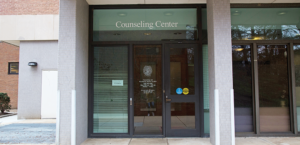Student mental health advocates launched a petition advocating for the university to fund a pilot program to subsidize off-campus mental health care for 40 students.
The petition, addressed to University President John J. DeGioia on Monday, requested funds for the pilot program from the Office of the President and through the creation of an alumni fund. The proposal was created by the Georgetown University Student Association’s mental health policy coalition.
GUSA’s proposal would provide a stipend to subsidize care for students who are no longer eligible for mental health care through the university’s Counseling and Psychiatric Services.

Chick said financial barriers prevent some students from accessing care once their time with CAPS expires.
“Although all students have health insurance, the exorbitant costs hinder a student’s ability to seek out care,” Chick wrote in an email to The Hoya. “The costs of high deductibles and additive copays prove to be obstacles for students who are seeking care.”
The average cost of therapy in Washington, D.C., ranges from $150 to $225 per hour, according to Chick. Under Georgetown’s student health insurance plan, the average deductible fee for medical services is $250 and the average co-pay is $25.
Chick said GUSA hopes to expand subsidized off-campus care options to cover more students if the initial pilot program is a success.
“The purpose of the pilot program is to collect data on the financial contributions required to subsist the subsidized off-campus therapy on 40 students,” Chick wrote.
Chick said the next steps for the development of the program after receiving funding from the President’s office and collecting the data include setting up an alumni fund and receiving private donations.
College counseling centers nationwide have reported high demand for mental health services this year, according to Pugh.
“Counseling directors are reporting three-to-four week waits and in some cases even two-to-three month waits despite ramping up staffing and finding new and creative ways to deliver services,” Pugh wrote.
According to Pugh, senior university leaders — including Assistant Vice President for Student Health Vince WinklerPrins and CAPS Director Phil Meilman — have met with GUSA mental health advocates to discuss their concerns.
“Georgetown remains committed to working with students on a range of initiatives to improve health services on campus and will be forming a student health advisory board in January to seek continued input from students,” Pugh wrote.
The university has started taking steps in recent semesters to provide platforms for students to air health-related concerns. Administrators initially planned to establish a student health advisory board this semester, a plan that was announced in February but has not yet come to fruition. The university now hopes to establish the board by the spring, WinklerPrins said at a graduate student health care roundtable Nov. 10.
Aaron Bennett (COL ’19), press secretary for the GUSA executive, said GUSA President Kamar Mack (COL ’19) and Vice President Jessica Andino (COL ’18) support actions taken to improve off-campus mental health availability for students.
“The Mack-Andino administration has always included mental health of the student body as a top priority for GUSA advocacy,” Bennett wrote in an email to The Hoya. “This proposal, which increases access to adequate care for a number of students who are most in need, is a step in the right direction to make sure everyone in our community is healthy and able to thrive here.”
In the past, GUSA has worked with the Mental Health Advisory Board, a joint student and faculty task force formed in fall 2015 by Vice President for Student Affairs Todd Olson to explore and address policy for mental health issues on campus, and university offices like Health Education Services and CAPS to improve mental health care accessibility and medical leave policies.
According to GUSA’s website, they plan to advocate for greater mental health programming in New Student Orientation and Blue and Gray campus tours.
Chick said GUSA’s proposal aims to equalize access to mental health services to further Georgetown’s Jesuit values.
“Currently, unlimited systems such as Yates and Campus Ministry exist for students to care for their bodies and souls, respectively,” Chick wrote. “This program ensures that everyone can have access to mental health services, especially the specific population that has a high need for service.”
The pilot program would cost between $34,000 and $40,000, approximately half of a Georgetown student’s tuition, according to Kenna Chick (SFS ’20), GUSA’s mental health policy coalition chair and the leader of the petition drive.
Chick said besides approaching the Office of the President for support, GUSA would solicit funding from private donors and alumni and student crowdsourcing platform SaxaFund.
The pilot program would provide data on the funding required to sustain the program for each student. Advocates hope to use the results of the pilot program to advocate funding for a further-reaching program that would serve more students.
CAPS currently provides individualized mental health care for a maximum of two semesters, after which the service refers students to off-campus providers, according to Rachel Pugh, the university’s senior director for strategic communications. Only about 55 percent of psychiatrists accept private insurance, according to a 2014 study by the National Institutes of Health.
“CAPS operates on a short term model and can provide a semester or two’s worth of services, consistent with what is typically done at other university counseling centers. Long term care is typically referred to community resources. Where finances are not an issue, such referrals work well,” Pugh wrote in an email to The Hoya. “CAPS also maintains a list of low cost and no cost providers in the local community to whom referrals can be made.”




















